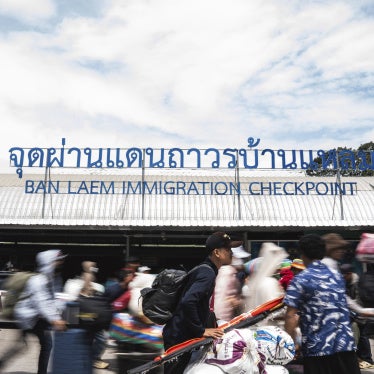(New York) --- In a new report released today, Human Rights Watch called for urgent efforts to separate militia members from civilian East Timorese in refugee camps in Indonesia. The refugees should also be allowed to choose freely whether to return from the camps in West Timor, the report said. An estimated 75,000 to 110,000 refugees are still in the camps, three months after most were forcibly expelled following a ballot on self-determination in East Timor.
"Thousands of East Timorese are effectively being held hostage by the very same militias that drove them from their homes in the first place," said Joe Saunders, deputy Asia director of Human Rights Watch.
International donors will be attending a World Bank-convened meeting in Tokyo on December 17 to discuss the future development of an independent East Timor. Saunders urged the donors to put the refugees at the top of their agenda. "Now is the time for concerted international pressure on Indonesia to get the militias out and allow the civilian refugees to return," said Saunders. Many of those who will be present at the meeting are also major donors to Indonesia.
The 19-page report, East Timor: Forced Expulsions to West Timor and the Refugee Crisis, is based on interviews with more than one hundred East Timorese returnees in transit centers in Dili, the capital of East Timor. It documents the continuing obstacles to return for East Timorese refugees in West Timor and other parts of Indonesia. The obstacles include death threats against families seeking to leave, attacks on convoys heading back for East Timor, militia-spread disinformation portraying East Timor as a desperate and dangerous place, and the presence in the camps of militia leaders believed to be responsible for attacks on civilians earlier in the year.
In the report, Human Rights Watch also sets forth new testimonial and documentary evidence that the expulsions were the result of a planned, systematic campaign coordinated by the Indonesian military. The report notes that the process of expulsion was highly similar from one end of East Timor to the other, and draws on eyewitness accounts of direct military involvement in the expulsions and military facilitation of militia campaigns of terror and intimidation of East Timorese. In many cases, district military command posts served as way stations for East Timorese civilians forced from their homes and subsequently transported to West Timor. This was not a case of evacuation of selected loyalists.
Human Rights Watch urged that international investigators preparing for a possible international tribunal should undertake more intensive gathering of evidence, including investigation of militia leaders whose whereabouts in the camps is known. The tribunal would prosecute crimes against humanity committed in the run-up to and immediately following the vote in East Timor.
On August 30, almost 80 percent of East Timor's eligible voters chose independence from Indonesia in a U.N.-sponsored referendum. Within days, the tiny half-island had become what one diplomat described as a "living hell." Army-backed militia members, armed with automatic weapons, launched a scorched-earth policy, targeting independence supporters for death; looting and burning homes, clinics, churches, and stores; and forcing hundreds of thousands of people from their homes. U.N. agencies estimated that three-quarters of the population was displaced, including an estimated 200,000 people to West Timor, most of whom had been forcibly expelled from East Timor by militia members who have continued to terrorize and target them there.
Although more than 100,000 refugees have already returned and many of those still left may be associated with Indonesian rule and may not wish to return, there are likely thousands of others who have not yet been able to make a free and informed choice.








